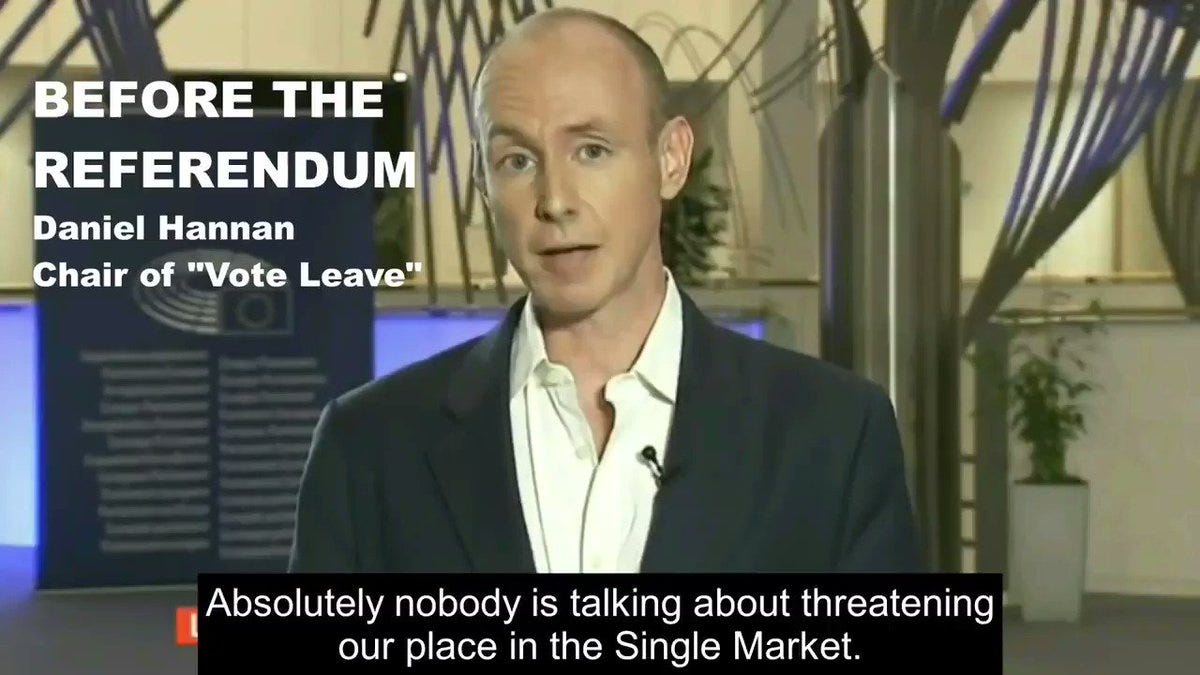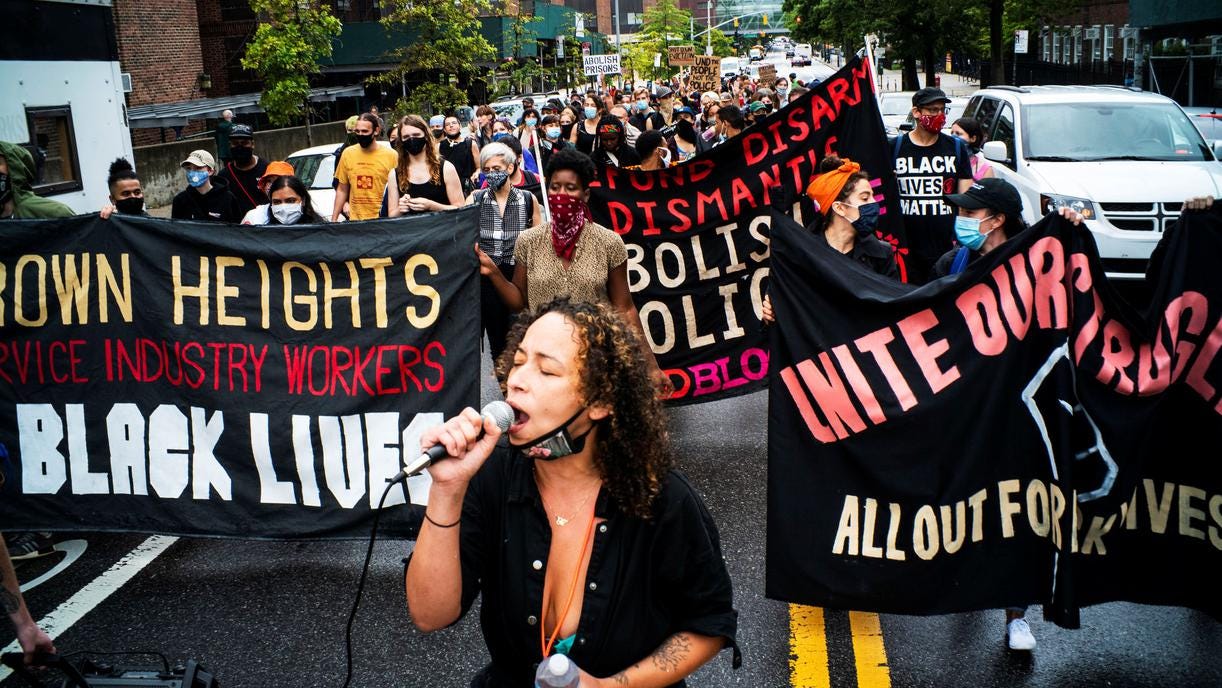The Conservatives have killed Thomas Cromwell’s England
How Brexit and 14-years of right-wing rule have destroyed our sense of ourselves
The enlightened and industrious Thomas Cromwell and the cranky and vicious Thomas More in the BBC adaptation of Wolf Hall
Please support my journalism by signing up as a free or paying subscriber. Free subscribers have access to some pieces. Paying subscribers have access to everything, and more importantly allow me to carry on writing! Best wishes, Nick
In his introduction to a posthumous collection of Hilary Mantel’s essays, her editor Nicholas Pearson makes an announcement as shocking in its way as the news that the white cliffs of Dover have crumbled into the Channel or that the ravens have fled the Tower of London.
Mantel, the author who more than any other modern artist sustained the myths of English nationalism, had given up on England, Pearson tells us at the start of her Memoir of My Former Self (just out from John Murray)
When she died, unexpectedly, in September 2022, she was a week away from moving from Budleigh Salterton on the Devon coast to Kinsale, in Ireland. Mantel wanted “a reconnection with her Irish Catholic roots,” Pearson says. But it was more than that. She could no longer stand what the Conservatives had done to the UK. Mantel and her husband Gerald McEwen were moving to Ireland “in part, an attempt to re-establish European citizenship in the wake of Brexit.”
There are two types of nationalism. The first the British have endured to excess: the bellowing, chest-beating, braggart nationalism that brought us the Brexit disaster, which Mantel so deplored.
Braggart nationalism was Boris Johnson assuring us we could be world-beaters just because we were British. It was David Davis, Michael Gove and every other leading right-wing politician promising the fooled and fleeced British public that European political and business leaders would be desperate to cut favourable deals with the UK because our might and wealth would be unignorable. It was the belief that outright lying to the public about Brexit bringing billions to the NHS and saving us from mass immigration was justified in the name of the greater nationalist good.
It was (and is) the belief that we must yank the UK out of the EU, the European Convention of Human Rights and any other treaty that constrains our ability to delude ourselves that we are still a great power, which can tell the rest of the world to go to hell. It was the malice that led the right to denounce those who disagreed with it as saboteurs, or enemies of the people, or in the case of Scottish nationalists, who are not as different from the Brexiteers as they would like to believe, as traitors guilty of “talking Scotland down”.
No one has done so much damage to the UK as the Conservatives who claim to love it the most. If you want to see where 14 years of right-wing rule have left us, look at the frankly terrifying report the Resolution Foundation issued on the UK’s decline.
Here are the highlights or lowlights: wages grew by 33 per cent a decade from 1970 to 2007, but have flatlined since, costing the average worker £10,700 per year in lost wage growth. Income inequality in the UK is higher than any other large European country. Low growth and high inequality work together to ensure typical households in Britain are 9 per cent poorer than their French counterparts, while our low-income families are 27 per cent poorer.
I could go on and dwell on the 50 percent of shift workers in Britain who receive less than a week’s notice of their working hours. Or about how UK companies have invested 20 per cent less than those in the US, France and Germany since 2005, placing Britain in the bottom 10 percent of OECD countries, and costing the economy 4 percent of GDP.
But rather than recite statistics let us just agree that conservative nationalism has ruined the country; and that austerity, Brexit, Trussonomics have been ideological displacement activities that have not just deepened our malaise but have stopped the right facing it or even admitting its existence.
The second type of nationalism was Hilary Mantel’s nationalism. It is the nationalism buried deep in the culture; of half-true myths and consoling stories that vast numbers of people, regardless of their politics, tell each other. In the UK’s case, there are two, that most people once took for granted.
We are a moderate country that does not tolerate extremism and prefers common sense. While the rest of Europe was seduced by madness of fascism and communism, we remained sensibly democratic and free.
Because we are an empiricist country, we are also an inventive country that gave the world the industrial revolution and beat the Nazis with Spitfires, bouncing bombs and by breaking the enigma code
British national myths are tied to Protestantism and a deep anti-Catholic prejudice, which for all the talk of having a reckoning with our imperial past, is barely discussed. Far into the 20th century it was axiomatic that the Reformation replaced a corrupt Catholic culture with Protestantism that led to the Calvinist work ethic and the industrial revolution. Throughout English history writing until quite recently you find historians harbouring the prejudice that to be Protestant was to be progressive and modern, and that the Reformation took the country forward.
Even on the left, which should have tried to break free of prejudice, there was a rather bizarre attempt by Christopher Hill and other Marxist historians of the mid-20th century to see the Protestant sects of the English civil war as the forerunners of socialists..
Mantel saw herself as an outsider from England’s soft, Tory south. She wrote in 2002
“As I grew up, I came to see that Englishness was White, male, southern, Protestant and middle class. I was a woman, a Catholic, a northerner, of Irish descent. I spoke and speak now with a northern accent. And if I tell an Englishman my date of birth and my religion and ancestry, I am telling him, without needing more words, that my family are working people, probably with little education."
But, as she went on to acknowledge “All these markers – descent, religion, region, accent – are quickly perceived and decoded by those who possess Englishness, and to this day they are used to exclude. You are forced off centre. You are a provincial. You are a spectator. If you want to belong to Englishness, you must sell off aspects of your identity. Possibilities of self-redefinition were presented to me. I could become educated, go and live in the south if I liked, abandon my faith and change my accent”
She did redefine herself. But it would not have mattered if she had stayed in the north, The point about national myths is that they are shared by north and south, left and right, insider and outsider. Or at least they were until the Tories took power in 2010.
Mantel reinforced them in her Wolf Hall trilogy. After the first volume appeared the Catholic bishops of Shrewsbury and Plymouth spoke out against the “anti-Catholic” bias of showing Thomas More (Saint Thomas More, if you are Catholic) as a “scheming villain” while making Thomas Cromwell - “surely one of the most unscrupulous figures in England’s history” – its hero.
The bishops had a case. Thomas More had not just been sanctified by the Catholic church. In the second half of the 20th century in A Man for All Seasons, Robert Bolt portrayed More as a man of conscience resisting the tyrannous Henry VIII break from Rome (the parallels with the dissidents who resisted Stalin and Hitler were obvious).
You still hear people quote the praise for the rule of law as a defence against arbitrary power Bolt put in More’s mouth.
Mantel, the lapsed Catholic, turned More into a vicious and tormented man. A snob and a fanatic, who persecutes protestant heretics. Meanwhile she turned Thomas Cromwell, the unscrupulous bureaucrat, into an enlightened, civilised politician, who despises More for his refusal to tolerate dissent.
In Bring up the Bodies, the second volume of the trilogy, Cromwell sees dissolving the monasteries as a way of freeing England from waste and corruption. He says of one
“Two hundred monks at the height of its fortunes, and now – what? – forty at most. Forty fat fellows sitting on a fortune. The same up and down the kingdom. Resources that could be freed, that could be put to better use. Why should money lie in coffers, when it could be put into circulation among the king’s subjects? His commissioners go out and send him back scandals; they send him monkish manuscripts, tales of ghosts and curses, meant to keep simple people in dread. The monks have relics that make it rain or make it stop, that inhibit the growth of weeds and cure diseases of cattle. They charge for the use of them, they do not"
Cromwell goes on to imagine using the wealth of the Catholic church to give England “better roads, and bridges that don’t collapse”. Mantel presents him as a Tudor Keynesian. He wants to set unemployed men to work “mending the roads, making the harbours, building walls against the Emperor or any other opportunist”. He wants an income tax on the rich so that Henry VIII might provide the poor with “shelter, doctors if they needed them, [and] their subsistence” in a 16th century version of the welfare state.
England’s deep cultural institutions loved Mantel. The BBC and Royal Shakespeare Company dramatized Wolf Hall. Booker juries twice awarded her their prize. Mantel’s portrait became the first painting of a living writer to be displayed in the British Library.
They loved her for her genius, for her depictions of power politics and sexual politics, I am sure. But they loved too because she reaffirmed national myths.
The Conservative have now made it impossible to believe in those myths. A moderate, practical country? Brexit has been the communism of the right, pursued with a Leninist ideological purity regardless of the consequences.
Mantel’s Thomas Cromwell is obsessed with stopping the continent uniting against England. If the Empire grows too powerful, he seeks to ally with France (and vice versa). First England and then Britain sought European allies to stop Louis XIV, Napoleon, the Kaiser, Hitler and Stalin dominating Europe and uniting it against us[i]. And now, because of Brexit, the whole of Europe can unite against the UK any day it chooses.
You cannot believe we are inventive and empiricist culture. No commonsensical country would have managed its affairs as the Conservatives have done. After 14 years of their rule Thomas Cromwell’s dream of providing the poor with “shelter, doctors if they needed them, [and] their subsistence” seems as distant as ever. Frankly, the Conservatives can barely provide them to the middle classes.
Because of the wreckage the right has left, Hilary Mantel, the justifier of the Protestant cause, was planning on rebuilding her connection to the Catholic church whose bishops had denounced her. The great artist, who reimagined English history had given up on England and wanted nothing more than to get out while she still could.
[i] As Sir Humphrey explains in the old sitcom Yes, Minister “ The Foreign Office is pro-Europe because it’s really anti-Europe. The civil service was united in its desire to make sure that the Common Market didn’t work. That’s why we went into it. Britain has had the same foreign policy objective for at least 500 years: to create a disunited Europe. In that cause we have fought with the Dutch against the Spanish, with the Germans against the French, French and Italians against the Germans, and the French against the Germans and Italians. Divide and rule, you see. Why should we change now, when it’s worked so well?”
This post has been free to read but please consider becoming a paying subcriber if you can. I can only keep working with your support.
Below is a taste of the content available if you take out a subscription
Seeing Russian fascism clearly
·
7 Apr
Arthur Miller, JK Rowling and the death of witch hunts
·
24 Aug
Elon Musk and the west’s fascist fifth column
·
9 Sept
If you’re so progressive, how come you’re so rich?
·
3 Jun
Tinker Tailor Tory Traitor
·
11 Jan
Daniel Hannan and the emptying of the Conservative mind
·
28 Aug
The roots of wokeness
·
21 Sept
Keep reading with a 7-day free trial
Subscribe to Writing from London to keep reading this post and get 7 days of free access to the full post archives.











